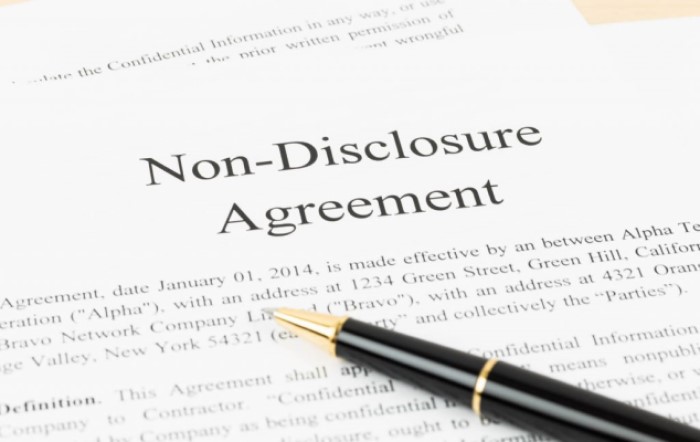
A nondisclosure agreement (NDA), also called a confidentiality agreement, ensures that all shared confidential information between two parties remains private.
The disclosing party is the one that shares the information while the receiving party takes it in.
Many NDAs are unilateral, wherein only one party will divulge private information to the other. But some NDAs are bilateral, under which both parties share confidential information. There are also multilateral NDAs where more than two parties exchange confidential information with one another.
NDAs are crucial to protect confidential information such as trade secrets, market research, client contacts, patents, and investments from a business’ competitors.
You can easily learn how to get a comprehensive NDA online and find comprehensive templates to create one yourself.
But before you sign an NDA, there are a few things that you should keep in mind to ensure that the agreement is fair and legal.
1. Know the Consequences of a Contract Breach
A well-written and comprehensive NDA will outline the consequences of sharing confidential information with parties not included in the contract.
Before signing the agreement, the receiving party should read it carefully and confirm that the consequences are proportionate to the degree of the breach. If the punishment seems too harsh for the type of information shared, the receiving party may be able to negotiate the terms of the contract.
If the NDA does not mention any consequences, it is a weak or poorly written agreement. In this case, it is best to proceed with caution.
Note that if you breach the contract—whether unintentionally or intentionally—you may need to pay financial damages and face a legal suit.
2. Check the Scope of the Contract
Before signing an NDA, make sure that the scope of the contract is clearly defined. This means that the terms of the agreement must be clear about what information needs to be protected and what does not.
Specific terms could include trade secrets, business plans, financial statements, employee information, customer lists, intellectual property, and more.
The disclosing party may prefer the scope of the contract to be as broad as possible, whereas the receiving party often prefers a narrower scope.
An NDA must also clearly indicate the schedule or duration of the contract. Do not sign an NDA without a precise end date. After all, you must be sure about how long you need to keep this information for yourself. Most NDAs last between 1 and 5 years.
If the NDA does not specify an expiration date, it should at least end on a specific event, such as the completion of a project or the dissolution of a partnership.
3. Negotiate the Terms
An NDA is always entirely negotiable until it is signed. So if certain clauses of the contract seem unjust or harmful to your interests, negotiate the terms and specific clauses till you reach an agreement. If the agreement contains overly technical phrases, do not hesitate to ask for clarification from the disclosing party or your legal team.
Once you sign the NDA, the terms and conditions that you have agreed upon will become legally enforceable, and there will be no backing out from the contract.
4. Beware of Ill-Defined Terms
An NDA must have clarity of language, which means it should have clear and specific terms and conditions that thoroughly outline what information must be kept confidential and for how long.
However, some companies or individuals may intentionally add ambiguous or poorly-defined terms to a contract to muddle the agreement and make the receiving party liable for various offenses. In this case, ask for clarification and ensure that all the terms are adequately defined.
5. Look Out for Non-Compete Clauses in an NDA
Often, a company may ask an employee or contractor to sign a lifetime NDA that bans them from working in the same industry for life. This kind of non-compete clause should be carefully read and considered. It can negatively affect the receiving party’s income stream and career, keeping them from working with other employers in their chosen industry.
The enforceability of non-compete clauses differs from state to state. Moreover, in 2021, President Joe Biden directed the Federal Trade Commission (FTC) to ban or restrict companies from using them for employees. As an employee or contractor, you should read up on the local laws before agreeing to such a clause in an NDA.
6. Follow your Instinct
If a term, condition, or clause does not feel right, do not hesitate to step away and reconsider the agreement. If the contract or the other party seems untrustworthy, it most likely is.
In this case, seek legal aid to help you identify and troubleshoot issues with the contract and gain peace of mind before you sign it.








